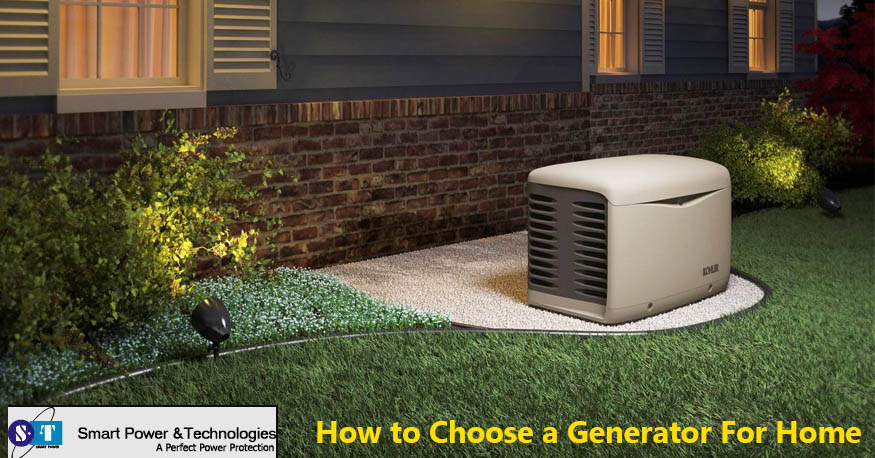In a world that depends on electricity more and more, picking a generator for your house is an important choice that will keep you ready for emergencies and power outages. There are many types of generators, so it’s important to pick the right one so you have a backup power source you can count on when you need it. If you want to protect your home and family from power outages or just deal with them often, you need to know how to choose a generator for home use.
This post will walk you through all the steps you need to take to choose the best generator. We’ll talk about the most important things to think about, like how much power you need, whether you want a portable or backup generator, where you can get fuel, and how much you can spend. We’ll also talk about important things like neighborhood rules and how important an automatic transfer switch is. By the end of this guide, you’ll know enough to make an intelligent choice and make sure your home has power all the time.
Size
It’s important to get the right size generator for your home so that it can power your important electronics when the power goes out. To make the right choice, you should figure out how much power you actually need by listing all of your important appliances and gadgets. For things with motors, you need to think about both the running watts and the starting wattage (surge). Once you know how much power you will need, choose a generator whose capacity is a little higher than your estimated load. This way, the generator will be able to handle sudden increases in power demand. Talking to a professional or using online sizing tools can help you figure out what size generator you need, giving you peace of mind when the power goes out.
Power
When looking for a generator, one of the most important things to think about is how much power the home needs. To answer the question “What size generator do I need?” you should think about how often the power goes out and how many watts are needed to run different systems, tools, and other devices. To help you choose the right whole-house generator size, you should also look into the fuel type, runtime, and transfer switch rates.
Wattage Needs
It helps to know the difference between starting wattage and running wattage so that you can figure out what power your home needs and pick a generator that can meet those needs. The numbers and methods below can help you get started, but you should talk to a dealer to get the exact generator size you need for your home.
- The amount of power an electrical device needs to turn on is called its starting wattage. Most of the time, this is three times the running power.
- A device’s running energy tells you how much power it needs to stay on.
Your home’s power needs will depend on how many and what kinds of electronics you want to use. If you want to keep a window air conditioner, a refrigerator, and a microwave running when the power goes out, for example, you would need about 2,400 to 3,500 watts, based on the makes and models. Here is a list of popular home appliances, systems, and other gadgets along with an estimate of their running wattage:
- Refrigerator/Freezer: 100-800 watts
- Electric Range (One Element): 1,200-2,100 watts
- Toaster: 800-1,800 watts
- Microwave: 600-1,200 watts
- Electric Oven: 2,000-5,000 watts
- Television: 80-400 watts
- Personal Computer: 100-800 watts
- Space Heater: 1,500-5,000 watts
- Table Lamp: 15-150 watts
- Electric Furnace: 10,000-15,000 watts
- Central Air Conditioning: 2,000-6,000 watts (varies widely based on size and efficiency)
- Water Heater: 3,000-5,000 watts (varies based on capacity and type)
- Window Air Conditioner: 500-1,500 watts
Fuel and Runtime
However, there are some types of portable and inverter generators that can run on propane instead of gasoline. Most of the time, both types will only run for 6 to 16 hours, or until they need to be refueled.
You never have to worry about running out of fuel with whole-house backup generators because they use fuel sources that are built into your home, like natural gas or liquid propane. Because of this, the generator will be able to run for a long time, giving you peace of mind during the whole power loss.
Cost
Like any other buy, you should think about how much the generator will cost. How much the generator costs will depend on its size, power, and how long it can run. If you only need a little extra power, a compact generator is a good choice. Most of the time, these generators cost less than backup generators.
You will need to get a backup generator if you need more power. It is much more expensive to buy a standby generator than a portable one, but it can give you power during a long power loss. It’s possible to look for deals on generators to get the best price.
Bottom Line
To sum up, picking the right generator for your home means carefully figuring out how much power you need, taking into account both the running and starting wattage, and picking a generator whose capacity is higher than the load you calculated. Getting help from experts and using measuring tools can make the process easier and make sure you have a backup power source you can count on when you need it most. To protect your home from sudden power outages and emergencies, you need to make an informed choice. This will give you peace of mind and a steady power supply during tough times.

